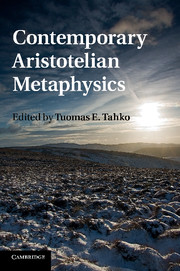Book contents
- Frontmatter
- Contents
- Contributors
- Preface
- Introduction
- Chapter 1 What is metaphysics?
- Chapter 2 In defence of Aristotelian metaphysics
- Chapter 3 Existence and quantification reconsidered
- Chapter 4 Identity, quantification, and number
- Chapter 5 Ontological categories
- Chapter 6 Are any kinds ontologically fundamental?
- Chapter 7 Are four categories two too many?
- Chapter 8 Four categories – and more
- Chapter 9 Neo-Aristotelianism and substance
- Chapter 10 Developmental potential
- Chapter 11 The origin of life and the definition of life
- Chapter 12 Essence, necessity, and explanation
- Chapter 13 No potency without actuality: the case of graph theory
- Chapter 14 A neo-Aristotelian substance ontology: neither relational nor constituent
- References
- Index
Chapter 2 - In defence of Aristotelian metaphysics
Published online by Cambridge University Press: 05 December 2011
- Frontmatter
- Contents
- Contributors
- Preface
- Introduction
- Chapter 1 What is metaphysics?
- Chapter 2 In defence of Aristotelian metaphysics
- Chapter 3 Existence and quantification reconsidered
- Chapter 4 Identity, quantification, and number
- Chapter 5 Ontological categories
- Chapter 6 Are any kinds ontologically fundamental?
- Chapter 7 Are four categories two too many?
- Chapter 8 Four categories – and more
- Chapter 9 Neo-Aristotelianism and substance
- Chapter 10 Developmental potential
- Chapter 11 The origin of life and the definition of life
- Chapter 12 Essence, necessity, and explanation
- Chapter 13 No potency without actuality: the case of graph theory
- Chapter 14 A neo-Aristotelian substance ontology: neither relational nor constituent
- References
- Index
Summary
Introduction
When I say that my conception of metaphysics is Aristotelian, or neo-Aristotelian, this has more to do with Aristotle’s philosophical methodology than his metaphysics, but, as I see it, the core of this Aristotelian conception of metaphysics is the idea that metaphysics is the first philosophy. In what follows I will attempt to clarify what this conception of metaphysics amounts to in the context of recent discussion on the methodology of metaphysics (e.g. Chalmers et al. 2009, Ladyman and Ross 2007). There is a lot of hostility towards the Aristotelian conception of metaphysics in this literature: for instance, the majority of the contributors to the Metametaphysics anthology by Chalmers et al. assume a rather deflationary approach towards metaphysics. In the process of replying to the criticisms towards Aristotelian metaphysics put forward in recent literature I will also identify some methodological issues concerning the foundations of Aristotelian metaphysics which deserve more attention and ought to be addressed in future research.
In Section 2.2 I will compare the Aristotelian and what could be called a ‘Quinean’ conception of metaphysics. According to the Quinean approach, the key questions of metaphysics concern the existence of different kinds of things, whereas the Aristotelian approach focuses on the natures or essences of these things. A somewhat different attack towards Aristotelian metaphysics can be found in Ladyman and Ross (2007), who group it under the label of ‘neo-scholastic metaphysics’ – a term which they use in a strictly pejorative sense: if metaphysics is not supported by current physics, then it has no value.
- Type
- Chapter
- Information
- Contemporary Aristotelian Metaphysics , pp. 26 - 43Publisher: Cambridge University PressPrint publication year: 2011
- 3
- Cited by

